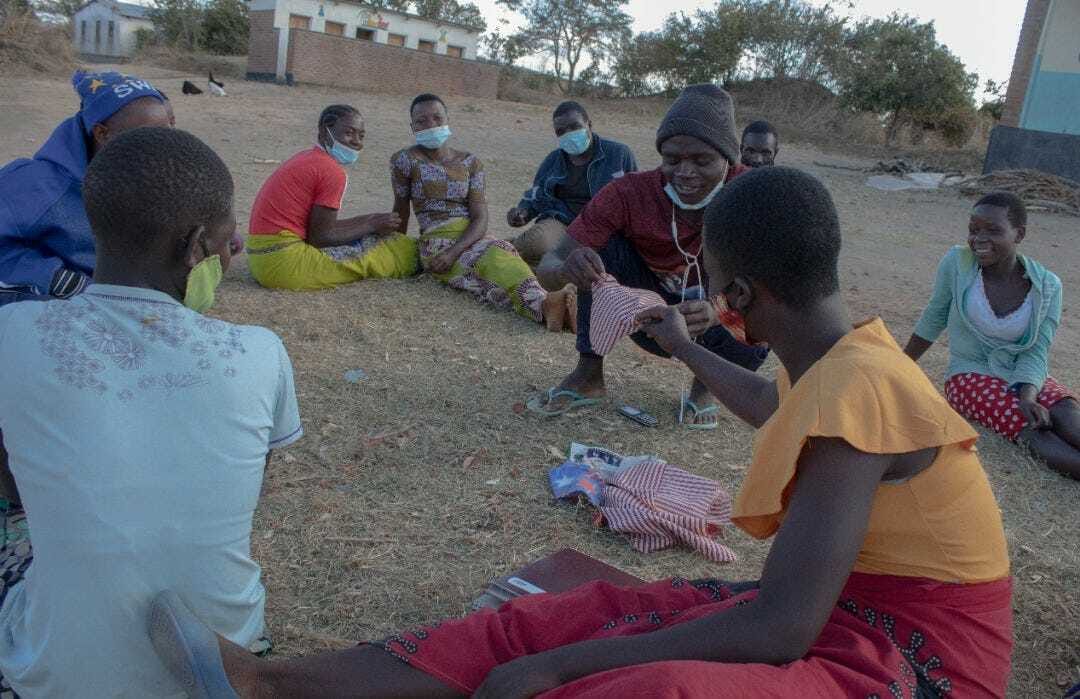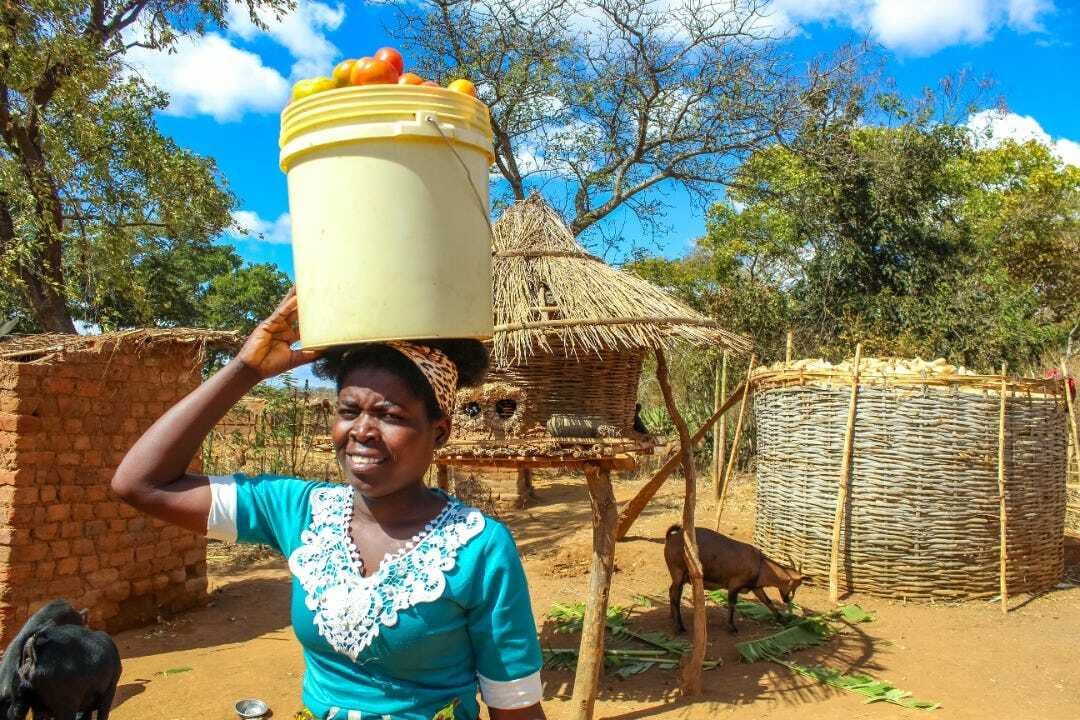….Female adolescents drop out of school,
…Shy away from taking part in agricultural production activities

It’s a sunny Monday afternoon, in Mpapa Village, in Malawi’s central region district of Ntchisi, located about 100km away from the capital city, Lilongwe.
As a practice, Mpapa Youth Club members have their weekly meetings and the discussion centres on reproductive health rights, life skills, adolescent nutrition, and food processing.
As they meet, one fascinating thing is that there is only one male adolescent against 10 female adolescents. His name is John Abraham. Despite that the topic under discussion is menstruation management, the male adolescent seems to be the one taking a lead in the activity of the day; demonstrating how to make reusable sanitary pads.
This is against all odds that menstruation and menstrual management have been an issue for girls and women.
“We learn a lot in our club and one of the things I enjoy most is how to support girls manage their menstrual periods. We were trained on how important it is for boys like me to support girls and not bully them when they are menstruating. Apart from gaining knowledge about menstruation management, we were also taught how to sew affordable and effective reusable sanitary pads,” said 19-year-old Abraham.
Impact of lack knowledge and poverty on menstrual hygiene
Abraham confesses that before gaining menstruation knowledge, he made life miserable for the adolescent girls as he used to enjoy menstruation bullying. He was always on the lookout for girls who had their periods spilled onto their uniforms so that he torments and make fun of them.
He said that was the order of the day because he did not realize how retrogressive his behavior was as he lacked menstrual knowledge and skills on how to support adolescent girls.
“A lot of girls dropped out of school because of period shaming and stigma,” Abraham recalls.
Poverty has also been a thorn in the flesh for most adolescents as they could not access safe and private washing facilities or afford adequate sanitary hygiene. They have been using unhygienic materials like tree leaves, old clothes, and used blankets, potentially increasing urogenital symptoms and infections.
“I have suffered from infections so many times because of the use of old blankets. It was even worse with the use of nzabwani and ntondo tree leaves, (a local version of tampons). Apart from infections, it was also uncomfortable to have the leaves inside you,” said a 17-year-old Estele Dickson from Kaphula village.

Interventions
Research has shown that there is limited involvement from male counterparts towards menstrual management and dealing with bullying and stigma. This lack of support has not only affected females’ class attendance but as well as their participation in community and agricultural activities.
According to the United Nations Population Fund (UNFPA), about 25 % of girls actually complete primary school. Nearly 60 % drop out for a variety of reasons related to poverty, lack of motivation, and poor sanitary facilities.
Another 15 % leave school specifically because of pregnancy and/or marriage.
Abraham is using the knowledge and skills he attained as a beneficiary of the Government of Malawi project implemented through the Farmers Union of Malawi’s (FUM) three-year pilot project namely Adolescent Nutrition-Sensitive Agriculture (ANSA) funded by the Japan Social Development Fund (JSDF) through the World Bank to support girls to remain in school and participate in different agricultural activities.
The project aims at increasing the production and consumption of nutritious foods and improving access to livelihood opportunities among selected female and male youths aged 10 – 19 in the impact area of Ntchisi and Mwanza.
FUM project Manager Modesta Tembo said the project is working with both male and female adolescents, in school and out of school, married or unmarried. One of the interventions being promoted is Sexual Reproductive Health Rights and Life skills.
“Poor menstruation management has negatively contributed towards adolescent girls’ participation in agricultural production and school attendance because when in their menses girls shy away from working with fellow adolescents. But with proper menstruation management and moral support from male adolescents, more girls are involved in the project’s interventions,” Tembo said.
Apart from building the capacity of the youths, FUM also provided materials for pad-making as a startup package such as flannel, cotton, and waterproof clothes and sewing threads plus needles so as to empower the youths.
The involvement of male adolescents is promoting equality and there is an increase in female participation in agriculture production and household consumption of nutritious food.
Though Ntchisi and Mwanza are over 350km apart, the success of male involvement is equally celebrated.
At 17 years old, Elise Gerald recalls how she almost drop out of school and withdraw from community participation after she had her uniform messed up. She did not have proper sanitary wear to protect herself from being exposed
“I almost dropped out of school because I felt embarrassed after the menses soiled my uniform. Though I tried to cover up the mess by tying my top in the waist, boys laughed at me as I walked home ashamed,” Gerald explains.
Following that ordeal, Gerald stopped going to school and never participated in community activities until one day when a peer leader visited her at home.
The visit was a turning point for Gerald as she was told how both male and female adolescents support each other in menstruation management.
From that day, Gerald is part of a youth group in Mwanza which is making strides in dealing with unhygienic menstrual management, menstruation stigma, and bullying.
“I am back in school. I am able to produce safe reusable pads for myself and some I sell. I am able to participate in all activities even during my periods. Apart from having a farming field as a group, I have a garden at home where I grow maize, vegetable, and some fruits. I also have chickens and goats,” she said.
Is menstrual bullying gender-based violence (GBV)
Around 500 million girls and women lack access to adequate facilities to manage their periods.
A 2018 UNFPA report based on a review of evidence on menstrual health management conducted by WoMena in East and Southern Africa indicates that shame, stigma, and misinformation surrounding menstruation are contributing to serious human rights concerns for women and girls.
In the review, period shame and misinformation are tied to the compromised well-being of women and girls, making them vulnerable to gender discrimination, child marriage, exclusion, violence, poverty, and untreated health problems.
“In Africa, it is high time we throw aside the myths and misconceptions, and the negativity that, for too long, has surrounded the menstrual life cycle, from menarche to menopause,” said Dr. Jullitta Onabanjo UNFPA’s regional director in East and Southern Africa.